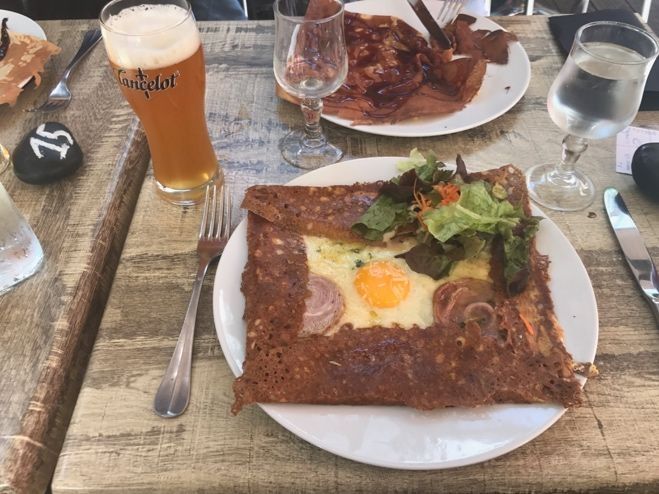French Food and Wine
I have an interest in the French food and wine culture. My passion is not only due to my ethnic roots and heritage in France, but stems mainly from my curiosity and love for French cuisine that began at a young age. The cuisine of France is unique—it’s sexy, sophisticated, and appealing in ways I have not found in other cuisines. Currently, French cuisine is considered the “staple” language of food. Other cuisines are often a derivative of French food, or spinoffs that use the intricate, very specific techniques of France to create a new cuisine. Not only are the ingredients, namely, the plethora of herbs and spices on meat courses, or generous additions of butter to classic croissants satisfying and delicate, but the plating, presentation, and execution of French cuisine is particularly aesthetically pleasing and inventive. It makes the objective to learn about the French cuisine a much more desirable undertaking than studying other European cuisines in this context. French techniques are also emphasized in most culinary schools worldwide, Le Cordon Bleu and The Culinary Institute of America for example, and in order to know the basics of cooking in most European countries, one must know the basics of French Cuisine effect on the French economy and this specific industry’s globalization.
The largest contributor to tourism in France is wine and food. In addition, not only do these industries contribute to tourism in France, they do so as well in the United States, and in my experience specifically where I come from in the region of Sonoma Valley and Napa Valley in northern California. In the United States, wine is grown by varietal, whereas, in France the region in which the wine is grown is a wine’s most identifying factor. The six main varietals of wine grown in California are Cabernet Sauvignon, Pinot Noir, Chardonnay, Merlot, Sauvignon Blanc, and Syrah. In France, familiar regions include Bordeaux, Champagne, Burgundy, Provence, Loire Valley and Alsace. The process of growing grapes and creating wine varies, and in France it especially differs from United States produced wine. The study of wine in each location is necessary for well-rounded and globally influenced food industry professionals. Because these two wine production processes are so different, I have yet to learn the particulars of French viticulture and the reasons of its globalization. Wine in France, is experiencing globalization not just through Europe and the U.S. for example, A New York Times article from 2014 discusses how Chinese students are becoming a larger percentage of the Bordeaux International Wine Institute class size. Worldwide wine consumption is expected to grow almost 9 percent, to $182 billion, by 2016, with a large chunk of the demand coming from China.
Though the international trading of French wine to the US, more recently in China, and other European countries is still flowing and successful, Domestic wine consumption is down in France as young people aren't drinking nearly as much as past generations. Production hasn't dropped, so producers must export which is hard and expensive, or they sell in bulk at little to no profit. Due to the drop in consumption, it is vital to cities like Paris and Rennes to have designated areas where young people aged 18-24 are able to spend time by going out for drinks, having dinner, and attending concerts or shows. In Rennes, the main downtown street called Rue St.-Michel is known as “La rue de la soif” translating to the “Street of Thirst”, where tourists and locals can find young adults to early hours of the morning spending time at eateries and bars. It has become a city of nightlife growth, where the city of Rennes is dependent on university students contributing to the local food and wine economy.

After spending 6 weeks here in Rennes, I have tried countless restaurants, cafés, pubs and bars across the city, and have thoroughly enjoyed every minute of it. Though, I have come to a few conclusions: The main dishes every single restaurant has are galletes and crepes, and I have been more inclined to drink beer here instead of wine. As Rennes/Brittany is not a wine producing region, I have no local wines to try, therefore as they are from other regions, they tend to be more expensive. But, Brittany does produce several different beers, they come cheaper and are delicious and different from American beers. It will be sad to leave for sure, but I will be back in Paris in the spring for a whole semester studying international business, and hopefully, try more wine.
Hanna Lemaire
University of Redlands
Related Posts
Sick in France : an opportunity to reflect on the healthcare system
Getting sick while studying abroad is never part of the plan, but it became an unexpected learning experience for me in France. While it was stressful in the moment, it... keep reading
Hosting Loved Ones in France
When my mom came during our winter break, we traveled together to Paris, Annecy, and Nice. It was a week full of slow mornings, long afternoons at coffee shops, and... keep reading
Première rencontre avec une personne inconnue à Rennes / My first interaction with a stranger in Rennes
«T’as pas froid ?» dit une voix venant de ma droite. «…» le temps de comprendre que quelqu’un me parle. «Me–euh moi ? Non, il fait pas trop mauvais pour... keep reading



